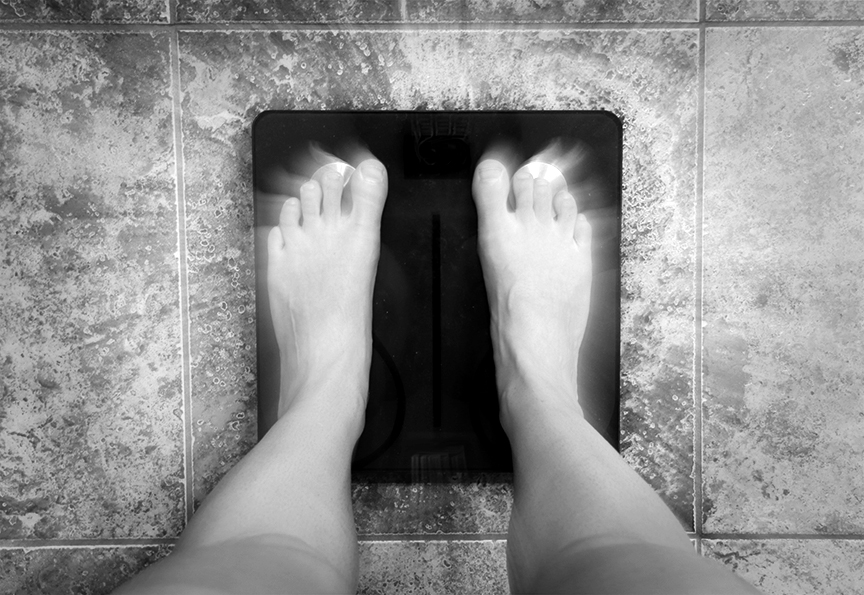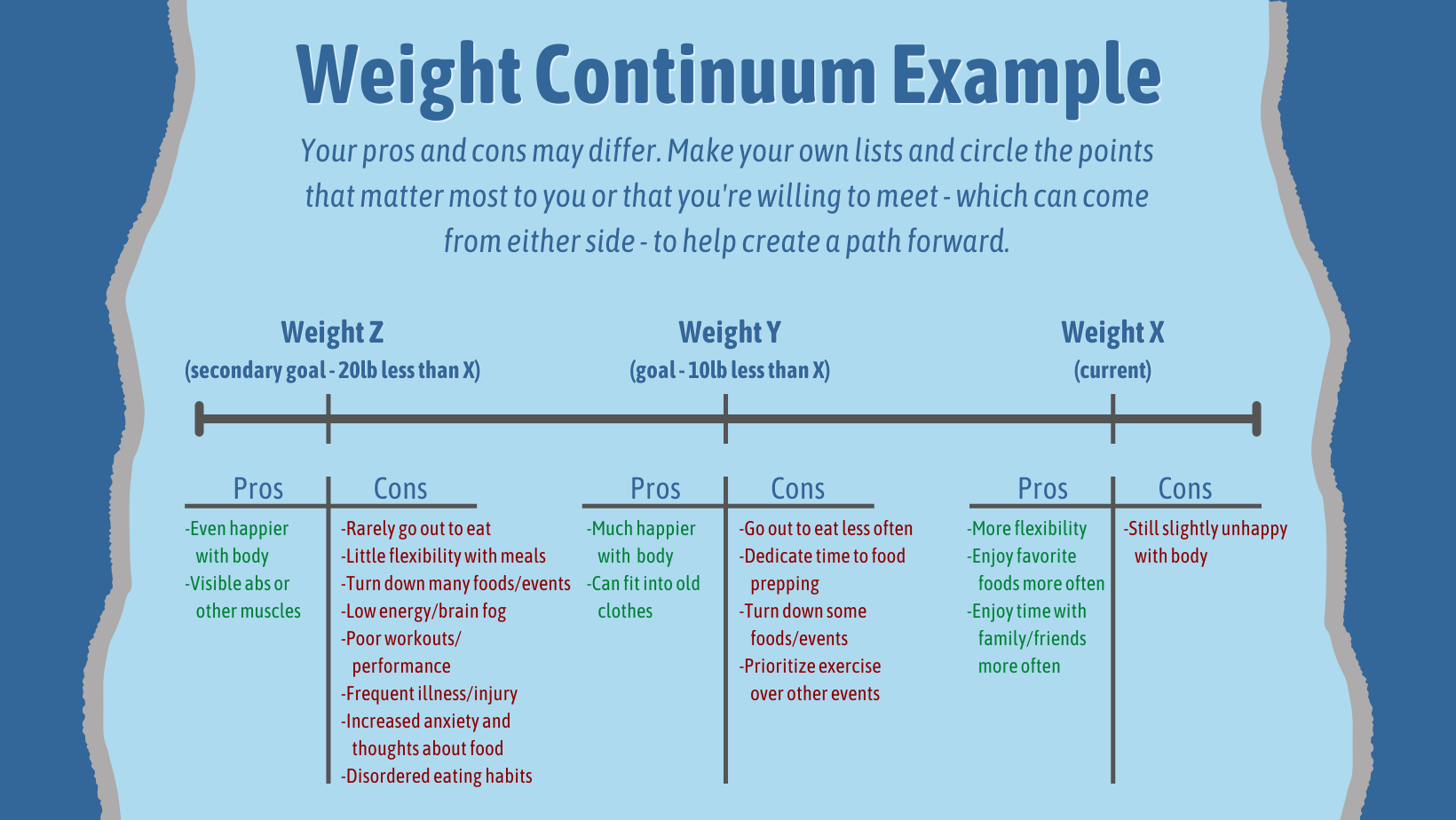
If you’re someone who currently has a goal of fat loss, especially if you’re struggling with “the last 10 pounds” or “the last 5 pounds” or whatever number it is: I’m going to ask you a challenging question.
Is your goal weight worth it?
Here’s something I’ve discovered throughout working with clients, and also something I’ve observed for my own body:
The “ideal” weight or image that you have for yourself might not be compatible with the way you want to live your life.
First of all, this ISN’T a trick where I’m trying to show you that it’s definitely not worth it for 100% of all cases. Maybe the above sentence about ideal weight isn’t true for you, and they match up just fine. Maybe your answer is “yes, it IS worth it,” because it’s your decision in the end. But humor me here and read on, just in case.
Let’s call your current weight X, and let’s say your goal weight is Y, which is 10 pounds less.
You’ve weighed Y before, and you liked the way you looked. Maybe you had visible abs, or fit into that outfit you really like. Or maybe you haven’t yet gotten to that weight, but you suspect these desirable traits will occur once you get there.
But you’re having trouble being consistent with the lifestyle changes you have to make to get from X to Y.
Take some time, sit down, and really think about what the trade-offs would be in order to get from X to Y.
For example, you might have to:
- Only go out to eat 1-2 times a week instead of 3-4 times, which means missing out on trying new restaurants with your partner, something you really enjoy
- Dedicate more time to food prepping instead of having pre-packaged meals, which can be convenient for your schedule
- Say no to cake sometimes at work events or your family member’s birthday party, even though you really want it
- Prioritize your exercise routine, even if you’d rather catch up on sleep or grab a beer with a coworker
- Generally maintain 85-95% consistency with your food and exercise habits
ADDITIONALLY, let’s say you reach your goal weight of Y, but you find you’re still not happy with your body (which is very common). You now feel compelled to keep going and set a new goal weight of Z, which is another 10 pounds lower.
The same trade-offs apply, but even more so; maybe it’s only going out to eat twice a month, and maintaining closer to 100% consistency.
Plus, at Z, you start to experience some physical and mental “side effects,” which could include:
- Low energy or brain fog
- Poor workouts or decreased performance
- Frequent illness or injury
- Feeling perpetually cold
- Thinking about food often throughout the day in such a way that it begins to overshadow your life
- Experiencing heightened anxiety when going out to eat or attending a party
- Potentially falling into disordered eating habits
- Continuing to be critical of your body and comparing to others
Perhaps your goal weight really is Y and not Z, so you don’t experience those side effects. But, at Y, you still have to implement some of the trade-offs, like saying no to outings or desserts, when that doesn’t make you happy.
Now, like I said before, this might not apply to everyone. There’s a continuum here, a sliding scale with points in between X, Y, and Z, and for you it might not look exactly how I described above. Our bodies are all different, and so will be the effects and trade-offs at certain weights.

Whatever the case is, think about your goal weight and the trade-offs, and ask yourself: is it worth it?
And again, maybe it is. As long as you know the cost of weighing Y, if you’re willing to pay it, that’s your choice.
(Though I would strongly argue that the example goal weight of Z, which would result in those physical and mental effects and more, puts your health at risk and that’s NOT worth it.)
But for many of you, maybe you’ll find that those 10 pounds to reach Y aren’t worth what you’d have to give up.
If you find you’re happier weighing X, you’re less stressed at 70-80% consistency, you still get to enjoy the foods you love very often, and you get to make memories with your family and friends, maybe you’re right where you’re supposed to be.
Losing more weight may satisfy one thing (your view of your body) but there’s a lot of other stuff it could negatively affect that may mean more to you.
Maybe the body you really want is the one that can still live an enjoyable life, even if that doesn’t match precisely how you want it to look.
Another side note: I’m not saying it’s impossible for you to have it both ways, that there’s no world in which you can be very flexible AND be happy with your body. Perhaps that’s you at weight X, or somewhere around there on the continuum, and this article doesn’t really apply to you.
And if you DO relate to this article, it doesn’t necessarily mean you’ll be unhappy with your body for your entire life if you choose to remain at weight X; you can always make the choice to actively work on body image, perhaps with the help of a qualified therapist, something I highly recommend if you’re willing and able.
There’s no right or wrong answer here, but I encourage you to give it some serious thought.
What are your priorities? What are you willing to give up to chase your goals? What are you NOT willing to give up?
What matters most to you? What choices can you make now that you’ll be proud of when you’re 90 years old looking back?
Think about it, and go from there.
-Dina

Dina Grimaldi is a triathlon & nutrition coach who helps athletes reach their goals while finding the balance they need to fit training comfortably into their lives, and who guides and supports those with nutrition or health goals to cultivate a lifestyle of sustainable habits and a healthy relationship with food.
Good, solid advice and lots of food for thought (if you’ll pardon the pun). I’ve definitely spoken with friends who’ve decided they were very unhappy sticking to a goal weight that left them feeling deprived. As you say, it’s a very personal decision – one that I bet few people stop to think about. Kudos for bringing this issue to the fore.
Thank you! It’s an easy option for people to dismiss because they might view it as failure, or they don’t want to give up that goal or image they have of themselves. It may take more time, and experiencing the tradeoffs, to come to the conclusion that they’d be happier with a different goal.